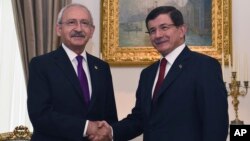News that the leaders of Turkey's two largest political parties will meet again to discuss forming a governing coalition caught many observers by surprise, given the widely held view that the coalition-building efforts were doomed. But with the conflict with the PKK Kurdish rebel group escalating, pressure to form a coalition government is growing, although large obstacles remain.
Caretaker Prime Minister Ahmet Davutoglu, who heads the AK Party, is set to meet again with CHP party leader Kemal Kilicdaroglu in a bid to form a coalition government after June’s inconclusive election. With the parties on opposite sides of the political spectrum, it has been widely predicted the talks would fail.
But the deepening conflict with the PKK is fueling both security and economic concerns in Turkey and providing a powerful impetus for the talks to succeed, says Semih Idiz, a political columnist for Turkey’s Cumhuriyet newspaper and Al-Monitor website.
"It provides an indication that they are trying to come up with some workable formula. I think there is a lot public pressure and expectation for them to do so. This is why neither side wants to appear to be the spoiler at the moment. So I think there is some hope, even though the general mood seems to be that nothing will come out of this," Idiz says.
President as obstacle
Both parties claim consensus has been achieved in many areas, but warn significant differences remain, in particular over policy towards Syria, education and the CHP’s demand that the corruption probes into AK Party rule resume. Those investigations implicate President Recep Tayyip Erdogan, an AK party founding member.
Cengiz Aktar, a political scientist at Istanbul’s Suleyman Sah University, says the president remains the biggest obstacle to any coalition government.
"What the president needs is a renewed election, out of which he expects his party to win an outright majority to make sure that he will be safe and sound forever. And many people do realize the problem lies with the president," Aktar says.
Erdogan has made little secret of his desire for an early election. Critics accuse him of provoking a conflict with the PKK to secure Turkish nationalist votes. But columnist Idiz says Davutoglu's future could be defined by the outcome of the coalition talks.
“It's really [a] make or break moment for Davutoglu. He is either going to have to defy Erdogan and possibly chart a political future for himself. Or he is going to go into Erdogan’s slipstream and prove that he is no politician really, that he is only a rubber stamp prime minister for the president. And we must not assume that everybody within the AKP is very happy about the situation as it is. They are heading for an AKP congress; there could be new names that vie for the leadership of the party. So there is a lot of pressure on Davutoglu," Idiz says.
Some Erdogan supporters have already called for Davutoglu to be replaced ahead of an early election that could happen in November, blaming him for losing the AK Party's majority in the June poll. The threat to Davutoglu would likely disappear if he is able to form a stable government. But most analysts are still predicting the prime minister will find it hard to resist Erdogan’s wishes for an early election.




